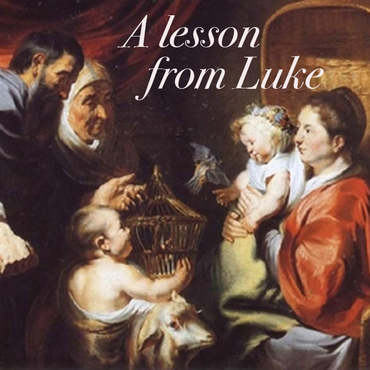 'Tis the season at SteynOnline: we have plenty of Yuletide delights over at the Steyn Store, including my unlikely and highly prescient demographic bestseller - and a book on what the new people of a new west mean for ancient liberties. And, if you really want to treat your beloved this Christmas, there's always a stateroom on the Mark Steyn Caribbean Cruise, where we'll enjoy a uniquely Steynian blend of sun, sea and civilisational collapse.
'Tis the season at SteynOnline: we have plenty of Yuletide delights over at the Steyn Store, including my unlikely and highly prescient demographic bestseller - and a book on what the new people of a new west mean for ancient liberties. And, if you really want to treat your beloved this Christmas, there's always a stateroom on the Mark Steyn Caribbean Cruise, where we'll enjoy a uniquely Steynian blend of sun, sea and civilisational collapse.
~You can find all our daily seasonal programming for this Advent lined up in the lower right-hand column of our home page - a Christmas cornucopia of songs, stories and special features. Today's column is one of my most-requested, because it was an early foray into what would become the demographic thesis of America Alone. It was written for The Daily Telegraph exactly twenty Christmases ago and riffs off a neglected corner of the Gospels. Two decades back, it was a passage that was semi-forgotten or not much thought about. Today, after another twenty years in the remorseless retreat of Christendom, even among Telegraph readers I would doubt a majority of readers has even heard of it. Unfortunately for a fading west, there appears to be at least a correlation between faith and fecundity - to which the surging Muslim populations of Europe can testify: it is as basic a vote of confidence in the future as any.
Conversely, the Continent's overall fertility rate continues to shrivel - and, where the core number looks comparatively less unhealthy (France), that is increasingly propped up by the Islamic minority. As we have discussed many times on The Mark Steyn Show, the recent further collapse in births in Finland, Switzerland and elsewhere (ahem, cough, the Covid-vaccine years) suggests that we are now moving from a mere psychological infertility toward a biological one.
On the other hand, we are happy to report that, since this piece was published, Israel's fertility looks a little healthier than Mr Netanyahu gave it credit for - although the unlimited youthful cohorts of Gaza are one reason why this conflict is not the same as that in Ukraine, the first war fought between two demographically exhausted populations (as those fifty-year-old Ukrainian male conscripts can surely tell you).
Demography is as basic as it gets. Europe, alas, remains largely blind to what lies ahead:
But the angel said unto him, Fear not, Zacharias: for thy prayer is heard; and thy wife Elisabeth shall bear thee a son, and thou shalt call his name John.
If you're one of the increasing numbers of Britons who have "some problems with conventional organised religion" (as JK Rowling puts it), you've probably forgotten that bit from the Christmas story. It's Luke 1:13, part of what he'd have called the backstory, if he'd been a Hollywood screenwriter rather than a physician.
Only two of the gospels tell the story of Christ's birth. Mark plunges straight into the Son of God's grown-up life: he was writing for a Roman audience and, from their perspective, what's important is not where Jesus came from but what He did once He got going. But Matthew was writing for the Jews, and so he dwells on Jesus and His parents mainly to connect the King of the Jews with all that had gone before: he starts with a long family tree tracing Joseph's ancestry back to Abraham.
Like Mark, Luke was writing for a gentile crowd. But, like Matthew, he also dwelt on Jesus's birth and family. And he begins with the tale of two pregnancies: before Mary's virgin birth, he tells the story of her cousin Elisabeth. Zacharias is surprised to discover his impending fatherhood - "for I am an old man and my wife well stricken in years."
Nonetheless, an aged, barren woman conceives and, in the sixth month of Elisabeth's pregnancy, the angel visits her cousin Mary and tells her that she, too, will conceive. If you read Luke, the virgin birth seems a logical extension of the earlier miracle - the pregnancy of an elderly lady. The physician-author had no difficulty accepting both. For Matthew, Jesus's birth is the miracle. Luke leaves you with the impression that all birth - all life - is to a degree miraculous and God-given.
There's a lot of that in the Old Testament, too, of course - going right back to Adam and Eve, and God's injunction to go forth and multiply. Or as Yip Harburg explained in his Biblical précis in Finian's Rainbow:
Then she looked at him
And he looked at her
And they knew immediately
What the world was fer
He said 'Give me my cane'
He said 'Give me my hat'
The time has come
To begin the Begat.
Confronted with all the begetting in the Old Testament, the modern mind says, "Well, naturally, these primitive societies were concerned with children. They needed someone to provide for them in their old age." In our advanced society, we don't have to worry about that; we automatically have someone to provide for us in our old age: the state. But the state - at least in its modern European welfare incarnation - needs children as least as much as those old-time Jews did. And the problem with the European state is that, like Elisabeth, it's barren.
Collectively barren, I hasten to add. Individually, it's made up of millions of fertile women, who voluntarily opt for no children at all or one designer kid at 39. In Italy, the home of the Church, the birthrate's down to 1.2 children per couple - or about half "replacement rate". You can't buck that kind of arithmetic. Four grandparents have two children and one grandchild: An upside-down family tree doesn't keep going for long.
In the Holy Land, where all the begetting first got going, they're doing the numbers, too. The rationale for Israel unloading the "occupied territories" is that, if they don't, Palestinians will do their sums, quit asking for their own state, and instead demand a one-man-one-vote arrangement for the state they're already in. Last week, in a speech on the country's demographic difficulties, Binyamin Netanyahu conceded: "We do have a demographic problem, but it is with the Arab Israelis."
"The day is not far off," replied Ahmad Tibi, an Arab member of the Knesset, "when Netanyahu and his cohorts will put up roadblocks at the entrances to Arab villages to tie Arab women's tubes and spray us with spermicide."
I would doubt it. Developed nations are far too busy tying their own tubes to tie anybody else's.
Demography is not necessarily destiny. Today's high Muslim birthrates will fall, and probably fall dramatically, as the Roman Catholic birthrates in Italy, Ireland and Quebec have. But demographics is a game of last man standing. It's no consolation that Muslim birthrates will start falling in 2050 if yours are off the cliff right now. The last people around in any numbers will determine the kind of society we live in.
You can sort of feel that happening already. "Multiculturalism" implicitly accepts that, for a person of broadly Christian heritage, Christianity is an accessory, an option; whereas, for a person of Muslim background, Islam is a given.
That's why, as practised by Buckinghamshire County Council, multiculturalism means All Saints Church can't put up one sheet of A4 paper announcing tomorrow night's carol service on the High Wycombe library notice board, but, inside the library, Rehana Nazir, the "multicultural services librarian", can host a party to celebrate Eid.
To those of us watching from afar the ructions over the European constitution - a 1970s solution to a 1940s problem - it seems amazing that no Continental politician is willing to get to grips with the real crisis facing Europe in the 21st century: the lack of Europeans. If America believes in the separation of church and state, in radically secularist Europe the state is the church, as Jacques Chirac's edict on headscarves, crucifixes and skull caps made plain. Alas, it's an insufficient faith.
By contrast, if Christianity is merely a "myth", it's a perfectly constructed one, beginning with the decision to establish Christ's divinity in the miracle of His birth. To the modern mind, the obligation to have children may be a lot of repressive Catholic mumbo-jumbo, but it's also highly rational. What's irrational is modern EUtopia's indifference to new life.
I recently had a conversation with an EU official who, apropos a controversial proposal to tout the Continent's religious heritage in the new constitution, kept using the phrase "Europe's post-Christian future". The evidence suggests that, once you reach the post-Christian stage, you don't have much of a future. Luke, a man of faith and a man of science, could have told them that.
~from The Daily Telegraph, December 23rd 2003
Programming note: Please join Mark tomorrow, Wednesday, for another Clubland Q&A, when he'll be taking questions from Steyn Club members live around the planet. The fun starts at 3pm North American Eastern - which is 8pm GMT.

























